The AMD 3rd Gen Ryzen Deep Dive Review: 3700X and 3900X Raising The Bar
by Andrei Frumusanu & Gavin Bonshor on July 7, 2019 9:00 AM EST** = Old results marked were performed with the original BIOS & boost behaviour as published on 7/7.
Benchmarking Performance: CPU Legacy Tests
3DPM v1: Naïve Code Variant of 3DPM v2.1
The first legacy test in the suite is the first version of our 3DPM benchmark. This is the ultimate naïve version of the code, as if it was written by scientist with no knowledge of how computer hardware, compilers, or optimization works (which in fact, it was at the start). This represents a large body of scientific simulation out in the wild, where getting the answer is more important than it being fast (getting a result in 4 days is acceptable if it’s correct, rather than sending someone away for a year to learn to code and getting the result in 5 minutes).
In this version, the only real optimization was in the compiler flags (-O2, -fp:fast), compiling it in release mode, and enabling OpenMP in the main compute loops. The loops were not configured for function size, and one of the key slowdowns is false sharing in the cache. It also has long dependency chains based on the random number generation, which leads to relatively poor performance on specific compute microarchitectures.
3DPM v1 can be downloaded with our 3DPM v2 code here: 3DPMv2.1.rar (13.0 MB)
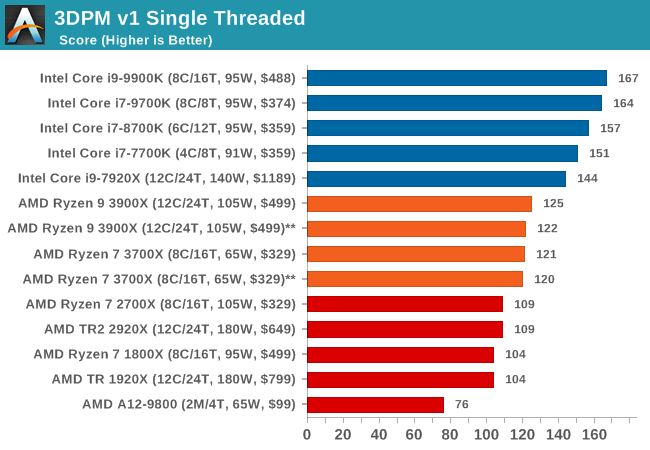
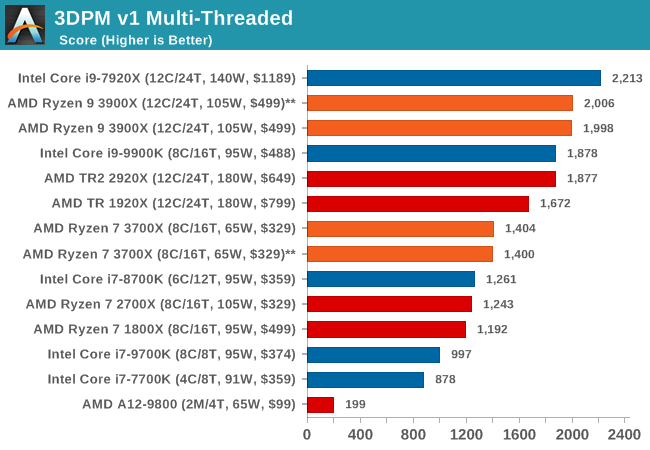
x264 HD 3.0: Older Transcode Test
This transcoding test is super old, and was used by Anand back in the day of Pentium 4 and Athlon II processors. Here a standardized 720p video is transcoded with a two-pass conversion, with the benchmark showing the frames-per-second of each pass. This benchmark is single-threaded, and between some micro-architectures we seem to actually hit an instructions-per-clock wall.
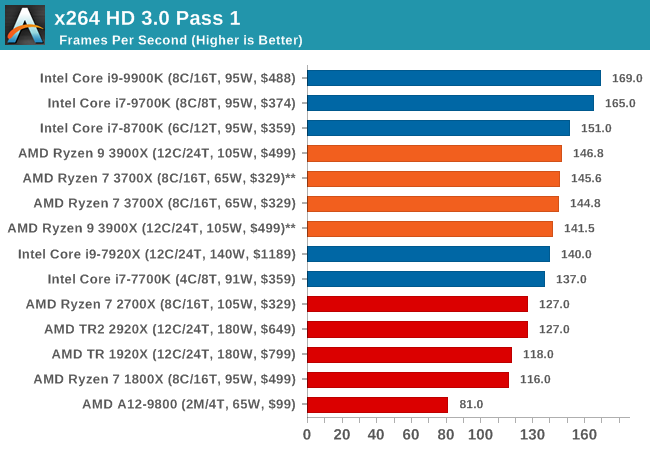
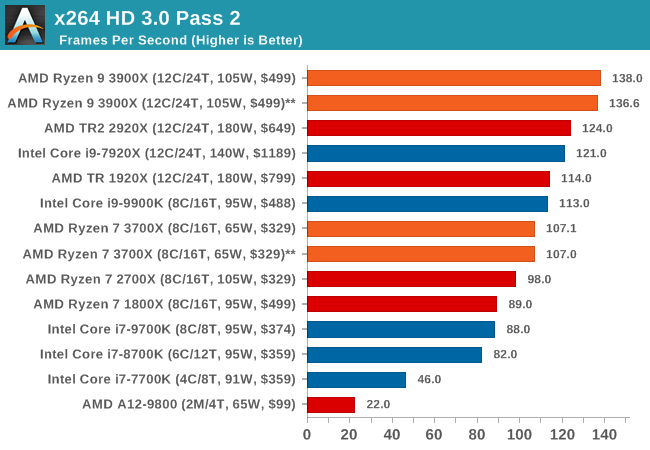
CineBench 11.5 and 10
Cinebench is a widely known benchmarking tool for measuring performance relative to MAXON's animation software Cinema 4D. Cinebench has been optimized over a decade and focuses on purely CPU horsepower, meaning if there is a discrepancy in pure throughput characteristics, Cinebench is likely to show that discrepancy. Arguably other software doesn't make use of all the tools available, so the real world relevance might purely be academic, but given our large database of data for Cinebench it seems difficult to ignore a small five minute test. We run the modern version 15 in this test, as well as the older 11.5 due to our back data.
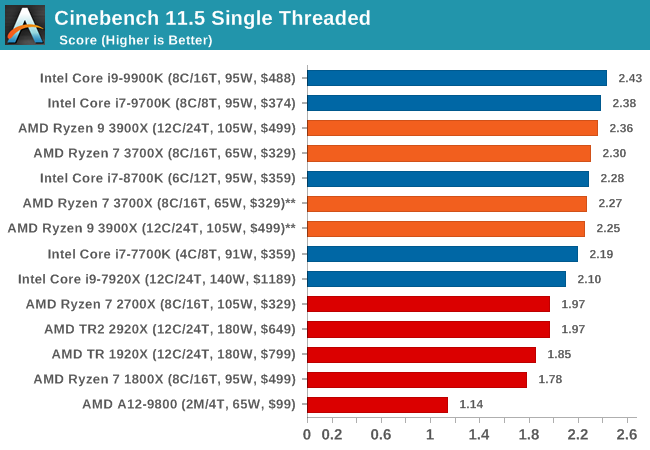
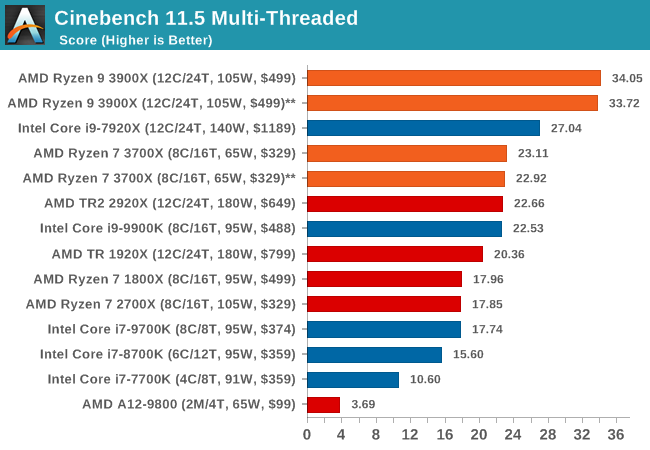










447 Comments
View All Comments
Daeros - Monday, July 15, 2019 - link
The only mitigation for MDS is to disable Hyper-Threading. I feel like there would be a pretty significant performance penalty for this.Irata - Sunday, July 7, 2019 - link
Well, at least Ryzen 3000 CPU were tested with the latest Windows build that includes Ryzen optimizations, but tbh I find it a bit "lazy" at least to not test Intel CPU on the latest Windows release which forces security updates that *do* affect performance negatively.This may or may not have changed the final results but would be more proper.
Oxford Guy - Sunday, July 7, 2019 - link
Lazy doesn't even begin to describe it.Irata - Sunday, July 7, 2019 - link
Thing is I find this so completely unnecessary.Not criticising thereview per se, but you see AT staff going wild on Twitter over people accusing them of bias when simple things like testing both Intel and AMD systems on the same Windows version would be an easy way to protect themselves against criticism.
It the same as the budget CPU review where the Pentium Gold was recommended due to its price/ performance, but many posters pointed out that it simply was not available anywhere for even near the suggested price and AT failed to acknowledge that.
Zombieload ? Never heard of it.
This is what I mean by lazy - acknowledge these issues or at least give a logical reason why. This is much easier than being offended on Twitter. If you say why you did certain things, there is no reason to post "Because they crap over the comment sections with such vitriol; they're so incensed that we did XYZ, to the point where they're prepared to spend half an hour writing comments to that effect with the most condescending language. " which basically comes down to saying "A ton of our readers are a*holes.
Sure, PC related comment sections can be extremely toxic, but doing things as proper as possible is a good way to safeguard against such comments or at least make those complaining look like ignorant fools rather than actually encouraging this.
John_M - Sunday, July 7, 2019 - link
A good point and you made it very well and in a very civil way.Ryan Smith - Monday, July 8, 2019 - link
Thanks. I appreciate the feedback, as I know first hand it can sometimes be hard to write something useful.When AMD told us that there were important scheduler changes in 1903, Ian and I both groaned a bit. We're glad AMD is getting some much-needed attention from Microsoft with regards to thread scheduling. But we generally would avoid using such a fresh OS, after the disasters that were the 1803 and 1809 launches.
And more to the point, the timeframe for this review didn't leave us nearly enough time to redo everything on 1903. With the AMD processors arriving on Wednesday, and with all the prep work required up to that, the best we could do in the time available was run the Ryzen 3000 parts on 1903, ensuring that we tested AMD's processor with the scheduler it was meant for. I had been pushing hard to try to get at least some of the most important stuff redone on 1903, but unfortunately that just didn't work out.
Ultimately laziness definitely was not part of the reason for anything we did. Andrei and Gavin went above and beyond, giving up their weekends and family time in order to get this review done for today. As it stands, we're all beat, and the work week hasn't even started yet...
(I'll also add that AnandTech is not a centralized operation; Ian is in London, I'm on the US west coast, etc. It brings us some great benefits, but it also means that we can't easily hand off hardware to other people to ramp up testing in a crunch period.)
RSAUser - Monday, July 8, 2019 - link
But you already had the Intel processors beforehand so could have tested them on 1903 without having to wait for the Ryzen CPU? Your argument is weird.Daeros - Monday, July 15, 2019 - link
Exactly. They knew that they needed to re-test the Intel and older Ryzen chips on 1903 to have a level, relevant playing field. Knowing that it would penalize Intel disproportionately to have all the mitigations 1903 bakes in, they simply chose not to.Targon - Monday, July 8, 2019 - link
Sorry, Ryan, but test beds are not your "daily drivers". With 1903 out for more than one month, a fresh install of 1903(Windows 10 Media Creation tool comes in handy), with the latest chipset and device drivers, it should have been possible to fully re-test the Intel platform with all the latest security patches, BIOS updates, etc. The Intel platform should have been set and re-benchmarked before the samples from AMD even showed up.It would have been good to see proper RAM used, because anyone who buys DDR4-3200 RAM with the intention of gaming would go with DDR4-3200CL14 RAM, not the CL16 stuff that was used in the new Ryzen setup. The only reason I went CL16 with my Ryzen setup was because when pre-ordering Ryzen 7 in 2017, it wasn't known at the time how significant CL14 vs. CL16 RAM would be in terms of performance and stability(and even the ability to run at DDR4-3200 speeds).
If I were doing reviews, I'd have DDR4-3200 in various flavors from the various systems being used. Taking the better stuff out of another system to do a proper test would be expected.
Ratman6161 - Thursday, July 11, 2019 - link
"ho buys DDR4-3200 RAM with the intention of gaming would go with DDR4-3200CL14 RAM"Well I can tell you who. First Ill address "the intention of gaming". there are a lot of us who could care less about games and I am one of them. Second, even for those who do play games, if you need 32 GB of RAM (like I do) the difference in price on New Egg between CAS 16 and CAS 14 for a 2x16 Kit is $115 (comparing RipJaws CAS 16 Vs Trident Z CAS 14 - both G-Skill obviously). That's approaching double the price. So I sort of appreciate reviews that use the RAM I would actually buy. I'm sure gamers on a budget who either can't or don't want to spend the extra $115 or would rather put it against a better video card, the cheaper RAM is a good trade off.
Finally, there are going to be a zillion reviews of these processors over the next few days and weeks. We don't necessarily need to get every single possible configuration covered the first day :) Also, there are many other sites publishing reviews so its easy to find sites using different configurations. All in all, I don't know why people are being so harsh on this (and other) reviews. its not like I paid to read it :)